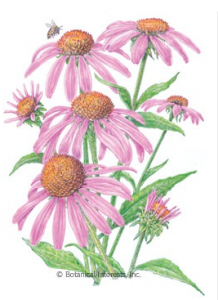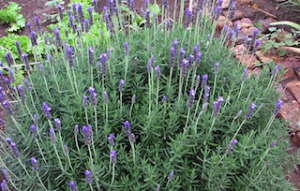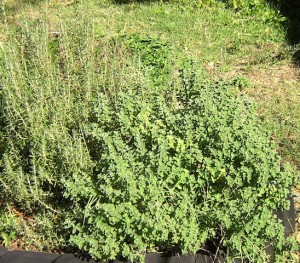Perennials are those plants that last year after year without needing to be reseeded or purchasing new plants. Generally, perennials are divided into 2 groups: evergreen and true perennials.
Evergreen varieties are those that don’t freeze down every Winter. These are mostly found in milder Winter areas, although many shrubs and a few flowers will be evergreen in colder climates. And, of course, “Evergreens” like pines, fir, cedars, etc. are called that because they are Ever Green!
In mild Winter areas, there are many evergreen types of flowers and shrubs. They don’t bloom all year, but the plant remains green even when dormant. Some of these bloom in the winter and are dormant in the summer and some are the opposite.
True perennials are flowers that grow and bloom in a particular season, usually the warm weather- spring or summer- and then the growing parts freeze down with the first frost. The frozen parts can be cut down to near the ground to neaten the garden.
If there are seed heads, however, like on some of the smaller sunflower types or Echinacea, aka Cone Flower, those should be left for the birds to feed on in the Winter. They can be cut down in early Spring when the seed heads are empty and new growth is peeking up. These perennials then start new growth in the Spring- early for some, late for others- and grow and flourish for another season.
Perennials can be the backbone of a flower bed because even after the flowers have faded, the plant still sports foliage that fills in during the rest of the season. Perennials are generally slower to grow from seed and may need up to 3 years to create a full size, mature plant.
Here’s an old gardening adage about perennials planted from seed: The first year they sleep, the second year they creep, the third year they leap!
If you’d like to grow perennials from seed, it takes patience. If you plant them in the garden when they’re small you can fill in around them with annuals until they attain their mature size.
Four Tips for Perennial Success from Botanical Interests Seeds
- Sow perennials that do not need *stratification 8 to 10 weeks before your average first fall frost. This allows time for the seed to germinate, and plants to establish a root system large enough to survive the winter.
- Sow perennials that need stratification after a hard, killing fall frost. This ensures that they will not sprout until the following spring.
- Mark the spot. Label the area of sown seeds.
- In a dry winter be sure to water late summer and fall-sown perennial seeds and seedlings just as you do your trees.
Check your Botanical Interests seed packet for specific instructions on stratification! Don’t forget to look inside the seed packet for more information!
*Stratification is the process of helping to break the seed coat of a perennial seed. In nature it is done by the cycles of cold and rain. We can recreate that process ourselves by placing seed in a moist growing medium and placing the seed in the fridge for a few weeks. Then, removing the seed and allowing it to germinate at a warmer temperature. Here’s more than you ever wanted to know about seed stratification!
Here at The Herb Cottage, I don’t sell too many perennial flower varieties. Echinacea or Cone Flower is one I do sell. I sell mostly annuals because they’re so easy from seed. Here’s an article on Fall Seeding of Annuals.
There are some herb varieties that fall under the perennial or evergreen category in mild Winter regions such as rosemary, oregano, parsley- technically a biennial- stevia, Mexican Oregano and a few others that are very slow to germinate.
They can be successfully planted in the Fall to come up in the early Spring and grow out as the weather warms.
I find it very rewarding to grow perennials from seed because of the time it takes. I feel my patience is greatly rewarded when I have a mature perennial successfully growing that I started from seed!



